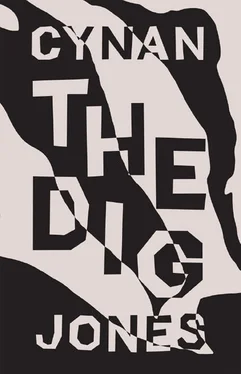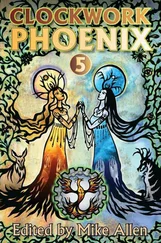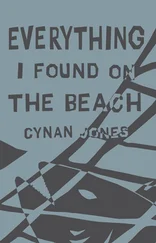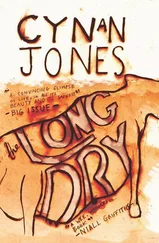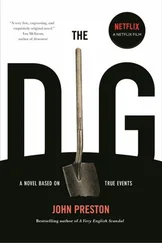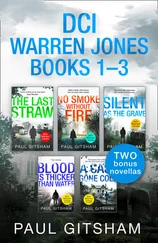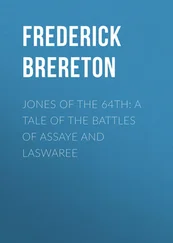The thin light was beginning to increase and the few bean-shaped flowers on the gorse stood out with unnatural luminosity. The men’s feet went down hard and solidly in the lane, but the boy constantly tripped on the loose stones the winter’s rain had brought down, as if he didn’t have enough weight to himself.
They went off the track and whistled the dogs in as they went over a field, the lambs prone and folded next to their mothers. Some of the smaller lambs wore blue polythene jackets against the rain and they looked odd in that first light and overprotected.
The boy could hear the ewes crunching and one or two faced the dogs and banged a foreleg on the wet ground, giving a thump that sounded like kicking a ball. He wished he could play, but he was clumsy against the other boys and this inability was just another little cruelty to him. Even now, he looked out across the lightening field and saw himself catch a high kick, the crowd of trees a fringe of spectators. But then — the school field, the ball smashing off his fingers, the laughter of the other kids. That was the reality of him and it brought up a wad of sick and anger.
They worked their way down through the topped reeds that stubbled the slope at the base of the field and stopped by the brook and the boy set the water down. They put the dogs to lead. His pup was shaking a little with excitement.
She’s got rats somewhere, he said. The sentence came out on the swell of pride and he realized it was the first time he had talked in front of the man.
The man lifted up a tub of water and unlidded it and took a rough swig.
Keep her in, he said. The bank’s snared.
The boy was made thirsty by the river and wanted to drink but he did not like the idea of drinking the water after the big man had drunk from the tub.
In the relative openness of the lane and across the field the dawn light had been enough, but here things closed in and they checked the snares with the torchlight.
Bar the one, the snares were empty. The boy heard the dogs whine with the scent of something and the man signaled them to hold back and the boy put the water tubs down and stretched his fingers. Then the boy heard the dull crack of the mink’s skull and for a while did not register what the sound was. The man had hit it with a foldaway spade.
They went on. The water had become convincingly heavy to the boy now. The scrub began to encroach the bank until it was thickened and difficult to pass and after a while they cut away from the stream. It was heavy going but somehow the big man had mobility in it and seemed to fit into the countryside in a way the other two did not.
The dogs sniffed in and out of the torch beams ahead of them and the men pushed through the sprawling holly and they drove into the wood. Every now and then they disturbed something and there was a clatter in the branches or the tearing of undergrowth as something fled. The wood thickened. Everywhere there were branches down and in the strange beams of light some looked animal and prehistoric.
•
They staked the dogs some way from the sett and poured them water and took a drink themselves. The boy had a queer feeling about the man’s mouth being on the water and still did not want to drink it.
The trees had opened up a little and you could see the light finally coming through. There was a moment of greater coldness, like a draft through a door, and the boy felt an unnerving, as if something had acknowledged them arriving there. They had made a lot of noise moving through the wood and when they stopped they heard the birdsong and the early loud vibrancy of the place.
First dig? said the man.
The boy nodded, with that hesitancy. They could hear the dogs lapping and drinking at the water bowls.
The main hole’s up there. The big man gestured up the slope. We’ll put in the dog, he said. He meant Jip, the big Patterdale.
The big man’s own bitch was by his feet, with her distant, composed look against the other dogs.
I want to put her in next. He indicated. Better be a dog goes in first. The big man was thinking of the big tracks and the possibility of the big boar. A bigger dog would have more chance up front. They knew if you put a bitch down after a bitch, or a dog down after a dog, there were problems most times; but if you changed the sex the other usually came out with no trouble.
The boy’s father nodded agreement. He was checking the locator, checking the box with the handset.
The boy was thirsty and looking at the water, not wanting to open the other tub in front of the man.
Take him round and block up the other holes. I’ll do the other side.
The big gypsy brought out the map he’d drawn of the holes and went over it with the boy’s father. The gypsy asked the boy if he understood and the redness came to his throat under the zipped-up coat collar; but he was feeling the rich beginning of adrenaline now. He was dry and thirsty and had a big sick hole of adolescent hunger but he could feel his nerves warming at the new thing and began to feel a comradeship of usefulness to the man.
They unwound the sheets of thick plastic and went off and systematically blocked the holes with stones and sheets of plastic and laid blocks across the obvious runs with heavy timber and then went back to the dogs. Then they went up the slope with the two first dogs and gathered around the main entrance and stood the tools up in the ground.
There was old bedding around the hole, the strange skeletal bracken starting to articulate its color in the gray light. Jip started to bounce on the lead and strain for the hole as if he could sense the badgers. The strewn bracken might have meant the badgers had gone overnight, but from the way the dog was behaving there was a fresh, present scent.
The boy looked at the dog straining on the lead and could feel the same feeling in his guts. He felt the feeling he did before the first rats raced out and the dogs went into them.
The boy’s father knelt with the excited dog and checked the box and collar over again and Jip let his enthusiasm solidify into a determined, pointed thing and stood stockily facing the hole, a determined tremble going through him.
The boy’s father studied the locator once more and checked the signal, then they sent the dog in.
The boy was not expecting the delay of listening for the dog. He could feel his stomach roll though. He could feel a slow soupy excitement. This was a new thing. Then deep in the earth the dog yelped. Then again; and his father was instantly by the hole, prone, calling to the dog, calling with strange excitement into the tunnel.
Stay at him, boy. Good Jip. Good Jippo.
The boy glanced at the man as his father called this out, as if it had revealed what he was thinking about the way the man looked. But the big gypsy seemed to be rapt, a pasty violence setting in his eyes as he listened and watched Messie, his bitch, solidify, focus. Finally, the dog let out a low whimper of desire.
You could hear the barks moving through the ground now and they came alternately sharp and muffled until they seemed to regulate and come with a faraway percussive sound.
The big man moved across the slope. He seemed to swirl in some eddy, then came to a halt, as if caught up on something.
The big man moved again, listening, and the boy’s father tracked across with the locator until the two men stood in the same place, confirming the big man’s judgment.
Here, he said.
They brought up the tools and they started to dig.
•
It was very early spring and the bluebells were not out but made a thick carpet that looked newly washed and slick after the rain. They cut through this carpet and cleared the mess of thin sycamore from the place and the big gypsy cut a switch and bent it into a sack mouth and laid the sack down by where they would dig.
Читать дальше
